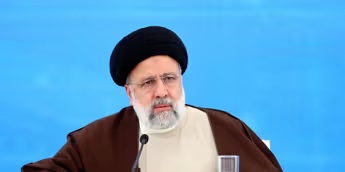Interior Minister Ahmed Vahidi told IRNA, Iran’s state-run news agency, that a helicopter carrying Raisi and other senior Iranian officials was forced to make a “hard landing” on Sunday, without providing further details.
Heavy fog and bad weather — and eventually night-time conditions — prevented rescue personnel from immediately reaching the scene, which led to several hours of uncertainty about the president’s status. It remains unclear what caused the crash.
Iran’s foreign minister, the governor of Iran’s East Azerbaijan province, and other officials were also on board the helicopter. The high-level Iranian delegation was returning from a ceremony marking a dam opening near Azerbaijan’s border. IRNA reported that two other helicopters carrying ministers and other officials who attended the ceremony reached their destinations safely.
Iran’s vice president, Mohammad Mokhber, is next in line for the presidency. According to Al Jazeera, Mokhber will take over until new elections can be held.
Who was Ebrahim Raisi?
Iran elected Raisi, 63, in 2021 after an election that saw the lowest voter turnout in the country’s history, according to the Associated Press.
Raisi is considered a “hard-liner” and a “protg” of Iranian Supreme Leader Ayatollah Ali Khamenei — the man who actually wields power in the country. Some analysts previously suggested Raisi could have replaced Kahmenei after his death or resignation, according to the Associated Press.
Raisi has led Iran through heightened tensions in the region, including the conflict between Israel and Hamas in Gaza. Iran is one of Hamas’ primary patron states, and has carried on a shadow war with Israel for years.
“Our heart is with the Iranian nation as a friend and brother,” Hamas said in a statement on Sunday, according to Iran’s state-run news agency.
In April, Iran launched a barrage of missiles toward Israel in an unprecedented direct attack. Most of those attacks were intercepted and ultimately caused little damage. It was a response to Israel’s attack on an Iranian consulate building in Damascus on April 1, which killed multiple high-level Iranian commanders.
The United States sanctioned Raisi in 2019 for human rights violations for his role in the “death commission” that ordered the execution of thousands of political prisoners in the late 1980s.
During this era, Iran subjected thousands of political dissidents to detention facilities across the country, executing many of them after an order from the Supreme Leader of Iran, The United States Institute of Peace reported.
Raisi was reportedly one of four members of the commission that subjected many of these prisoners to “torture and other cruel, inhuman or degrading treatment or punishment,” the report says.
Raisi has also provided arms to Russia during its invasion of Ukraine. The Iranian-made “Shahed” drones used by Russian forces, for instance, have been used to hit civil and military targets in Ukraine, and have taken a toll on Ukraine’s antiaircraft defense systems.








